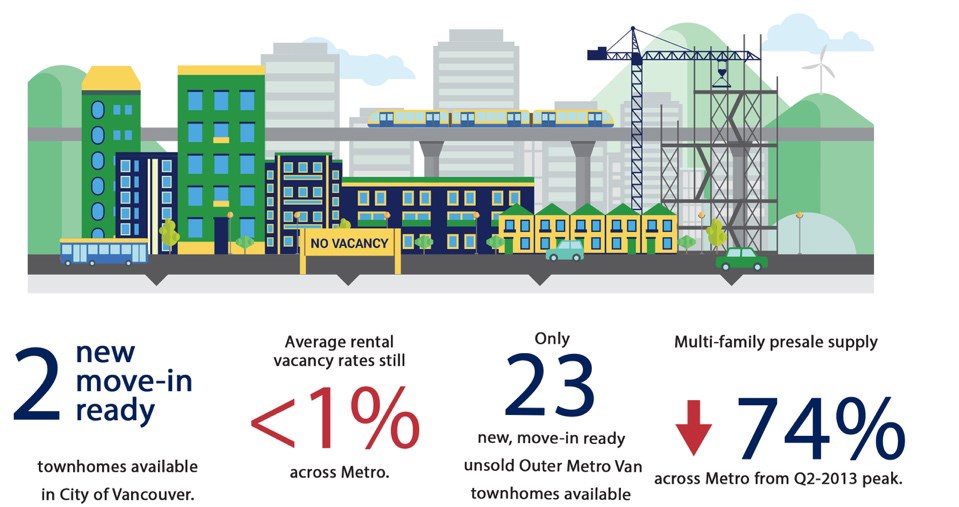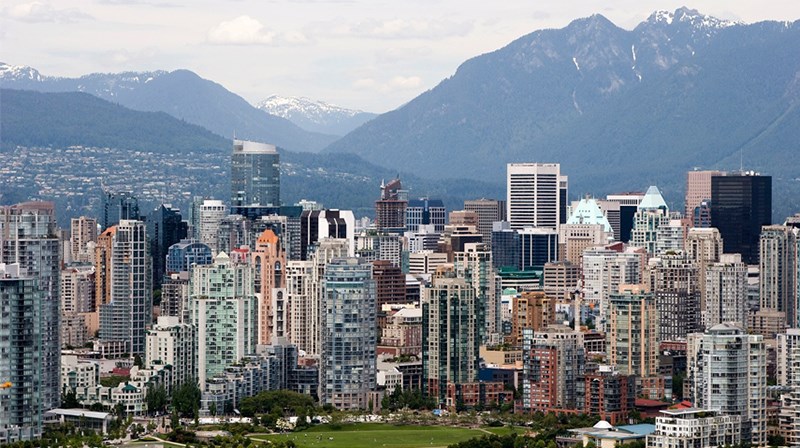If you’re looking for a brand-new, move-in-ready (not presale) townhome or condo within Vancouver’s city limits, you’re likely out of luck, according to the latest report by the Urban Development Institute (UDI).
The development industry body’s quarterly State of the Market analysis, carried out for the UDI by research group Urban Analytics, found that there were just two townhomes (both priced above $1 million) and one solitary new condo that were completed and available for sale within Vancouver proper, as of 2017’s fourth quarter. These calculations do not include unfinished presale units, contract assignments or those on the resale market.
For those happy to live in the outer Metro Vancouver area, such as Langley or Surrey, there was “some modest relief” with 23 new townhomes and 14 condos available to buy and ready to move in, according to the report.
Across the whole of Metro Vancouver, the report found just 80 new move-in-ready multi-family units available to purchase, according to Michael Ferreira, managing principal of Urban Analytics. This is a drop of 95 per cent from the five-year average of 1,776 move-in-ready units in a given quarter.
The report said that the total number of new, unsold multi-family homes for purchase across the region, including presale and under-construction condos and townhomes, in addition to move-in-ready homes, increased slightly from Q3’s 1,813 units to 2,554 units. However, the report added, this is still down 74 per cent from the peak of 9,858 units in Q2 2013.

Anne McMullin, UDI president and CEO, said, “While pointing the finger at foreign buyers gains public support, the biggest obstacles are still municipal permitting delay bottlenecks, which can take years, and restrictive, single-family zoning, on about 85 per cent of residential land across Metro Vancouver.”
She added, “The BC Budget announced last week is also predicting a 27 per cent decline in housing starts this year. How do all the new taxes and housing supply reductions really help house the 30,000 new, annual Lower Mainland residents?”
Some senior academics and political leaders have disputed the claim that a housing supply shortage is the key problem in Vancouver’s housing crisis. UBC professor David Ley told the Courier Tuesday, "It’s important to remember that the UDI is a lobbyist for the development industry and their views unwaveringly promote the goals of the industry. Critics point out that a supply emphasis in policy over the past 20 years has favoured the industry but affordability has collapsed. So groups like the City of Vancouver, the Union of BC Municipalities and the new provincial government now argue that supply has to be affordable to people working in Vancouver to be relevant, ant that requires more regulation, including the regulation of speculative demand.”
The city’s chief planner Gil Kelley also asserted to council last November that Vancouver has “produced more [housing] than our population growth would demand on its own,” and that supply alone won’t improve affordability in a city with a “very extreme level of speculative investment in real estate, primarily in high-end condominiums.”



